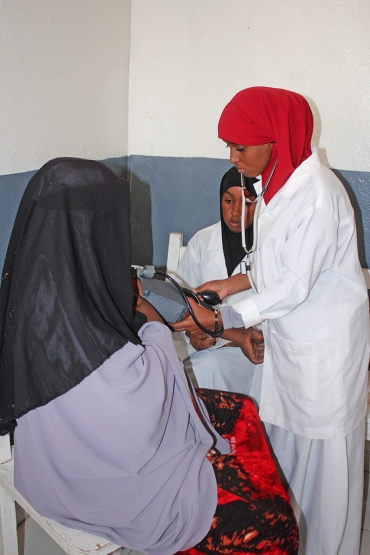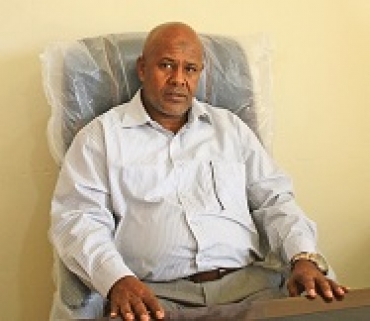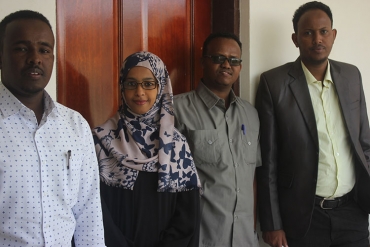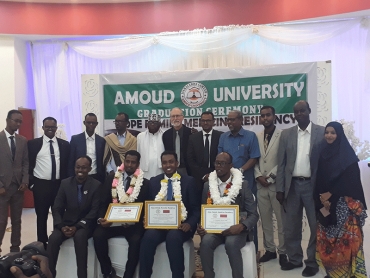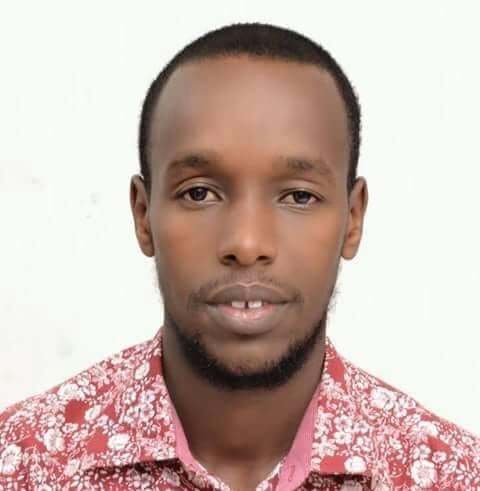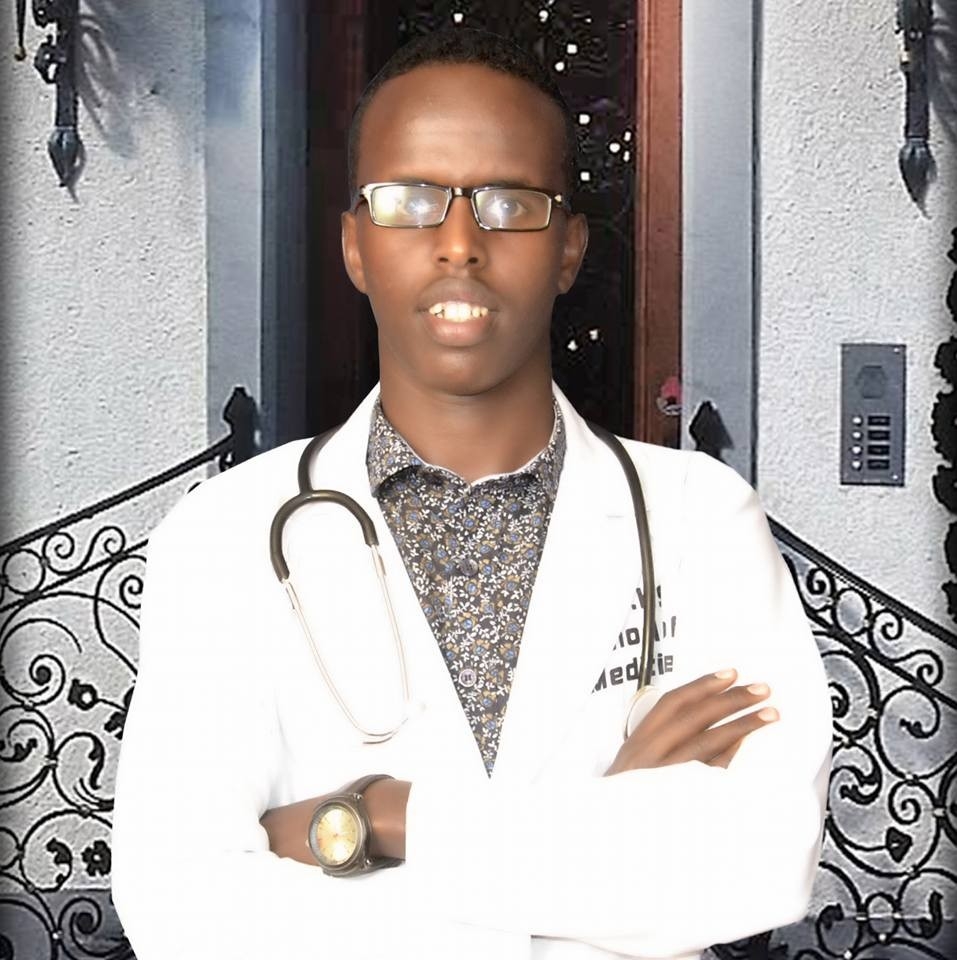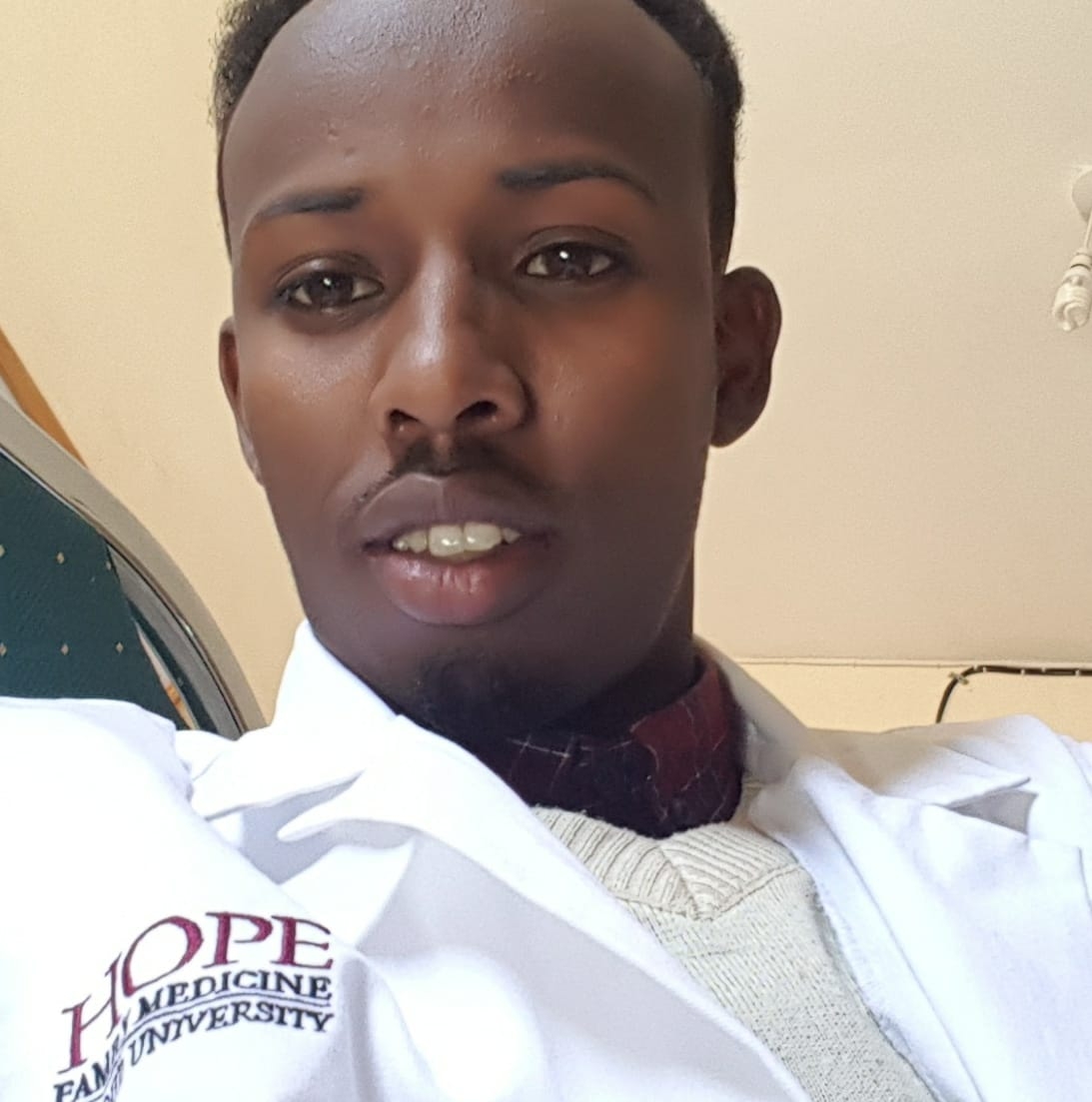
Amoud Web Team
Amoud Nursing School was established in the academic year 2006-2007. Its academic program is designed for four years and is to meet the educational requirements of the nursing students who are enrolled in the Baccalaureate nursing program at Amoud University. It is the first nursing school in Somaliland/Somalia which offers a degree programme in nursing.
The purpose of the Baccalaureate Nursing Program at Amoud University is to provide quality nursing education which prepares graduate students for professional nursing practice as generalists. It Prepares graduates who will be able to contribute to the development of nursing education, nursing administration, nursing research and address the challenges facing the healthcare system of Somaliland /Somalia.
The courses in the curriculum emphasize communication skills, critical thinking, professionalism and the development of lifelong learning. Curricula will be built around an integration of knowledge and practice and will focus on a holistic view of individuals, groups, families and communities. The program will help them acquire a range of professional nursing skills that will enable them to work with clients in a variety of areas such as health promotion, prevention, acute and chronic care. Graduates of the Baccalaureate Nursing Program will be able to: Function effectively as nurses in a hospital and in a community setting. Exhibit personal and professional development responsive to change nursing, healthcare and society, develop professional and leadership skills to design, coordinate and improve the healthcare
system of Somalia.
Concerning maternal and neonatal health more than 90% of women deliver at home and more than half are assisted by a traditional birth attendant. Access to skilled delivery care and emergency obstetric care is poor and rural and nomadic populations are virtually without access to timely obstetric intervention. The present pool of qualified reproductive health staff is small, aged and under-trained with a grave shortage of qualified midwives. Urban clustering of qualified midwives and doctors leaves rural areas relying heavily on auxiliary staff, most of who are inadequately trained for their job. Doctors are presently graduating in small numbers whilst midwifery education does not exist all. Because of this Amoud Nursing School has recognized the value of the midwifery education programme due to the urgent need to address maternal health issues which had been neglected for the last decades and started a Bachelor of midwifery dividing its students at second year of study. One group studies general nursing and the other group studies midwifery and Diploma of community midwife to increase the access both for the rural and urban areas to fill the gap in the working force of the reproductive health.
The Community midwifery curriculum uses the same structure and principles as the Post-basic midwifery programme. Indeed many of the learning experiences are the same despite some differences in job description. It differs mainly in their level of knowledge and understanding of the theory and evidence that underpin midwifery practice. The educational Programme presents broadly a core content addressed at different levels In order to achieve designation as
skilled birth attendants (WHO undated) and fulfil the ICM Definition of the Midwife (ICM 2011 and Annexe 1) and the Essential Competencies for Basic Midwifery Practice (ICM 2010a and Annexe 3) and to address the indicator of proportion of deliveries attended by skilled birth attendants for MDG 5.
Strengthening Midwifery Faculty teachers
Amoud University has successfully established the School of Nursing and so far has graduated four groups of nurses with BScN. The university has also enrolled students for a community midwifes training for the rural districts and villages of Somaliland. The vision for the community midwifery programme is that women selected by their communities for rural and remote areas of Somaliland to serve them as midwives will be able to meet the requirements of the 2011 international definition of the Midwife and the 2010 essential competencies for Basic Midwifery practice.
Amoud College of Health Sciences aims to train professionals with higher education and qualified for the respected professions. To produce well trained midwifes, the faculty of nursing and midwifery needs to have expert midwife teachers to implement the BScN midwifery program as well as the community midwifery program. Therefore, strengthening the midwifery faculty teachers is a priority .This project will help us train a two year post BScN
midwifery teachers. The graduates of this program will be able to teach in the midwifery school.
Amoud School of Nursing has started the postgraduate study of nursing education and is designed to prepare students to meet established nurse educator competencies. Students acquire knowledge, develop skills, and internalize values needed for success as a nurse educator in areas and are to upgrade the teaching capacity of the nurses interested in teaching nursing programs or in staff development departments.The curriculum involves a rigorous and complementary combination of clinical and professional content with a focus on teaching and learning, the evaluation of learning, course development and curriculum/program development and evaluation. It also emphasizes evidence-based teaching practices to help students develop as educational scholars who can contribute to the development of the science of nursing education.
Master of Nursing (MSN) in Sexual Reproductive Health is a distance learning program offered by Amoud University and Faculty of Nursing of Dalarna University (Sweden). It will enable the students to perform research and management issues which are pertinent to reproductive health nursing problems and manage patients in clinical areas. The program is offered by Dalarna University through online lessons. Students will also be completing clinical placements in hospitals mainly in Borama and Primary health care centers. This program is only available to Registered nurses with at least one year of clinical practice prior to applying for this program. The mission is to create knowledge through research,produce future leaders, future instructors and define this advanced practice in Sexual and Reproductive health in Somalia/Somaliland.
| Dean School of Nursing & Midwfery | Associate Dean | Assistant Dean |
| Dr. Fatima H. Abubakar | Mr. Ilyas B. Said | Mr. Abdirisak M. Ahmed |
| 00252634455293 | 00252634500713 | 00252634513660 |
| This email address is being protected from spambots. You need JavaScript enabled to view it. | This email address is being protected from spambots. You need JavaScript enabled to view it. | This email address is being protected from spambots. You need JavaScript enabled to view it. |
Amoud Medical School was established in 2000-2001. Its academic program is designed for six years medical education leading to the degree of Bachelor of Medicine and Surgery (MBBS). The school is partnering with King’s College Teaching Hospital of London which provides teaching assistance and Kijaabe Hospital of Nairobi which provides support in the form of dispatching lecturers on periodic-basis to AMS.
The school also recruits Somali doctors to help the school in community-based medical education. Special attention is exercised to the quality of medical education through out, starting from admission to graduation. The School’s concept and philosophy necessitates the adherence to valid concepts of education using modern trends and effective methods with flexibility.
The curriculum is community –oriented medical education (Learning experience for the students and services for the community with the objectives of giving the students the appropriate skills, attitudes and knowledge in identifying and dealing with the community problems) and uses student-centered approach with emphasis on self-learning to develop in the students the ability and willingness to pursue their own learning after graduation. During the educational program the students come into contact with different communities with different situations to recognize the characteristics of the Somali family, relations, culture, attitude towards health, knowledge and practice in state of health and disease and become familiar with the people they will work for after the completion of their medical studies.
The School of Medicine has started postgraduate studies with family medicine residence at the academic year 2013 which is designed for three years studies leading to Master of Medicine. The Family Medicine Specialist is a generalist physician.
The family physician provides care that is comprehensive, extending from birth to death, for men, women and children, covering a broad range of illnesses.
The family physician coordinates care among other specialists and non-physician providers, integrating care at various levels of the health system. The Family Medicine Specialist provides holistic care of the whole person, rather than simply disease oriented treatment. Family medicine is community oriented, recognizing the context of the individual in a community impacted by public health issues.
The Family Medicine Specialist focuses on the preventive and promotive aspects of care, as well as curative. The Family Medicine Specialist provides care that is continuous over a long period of time, rather than episodic. Finally, family medicine is cost-effective, using limited resources wisely. As a generalist, the Family Medicine Specialist can function well in a variety of settings, academic or non-academic, rural or urban, private or public, among the rich or poor, in district or provincial hospitals or clinics.
However, this curriculum is designed specifically to prepare the Family Medicine Specialist to function in the District Hospital. Upon successful completion of the 3 year training program, Amoud University will grant each graduate a Certificate of Specialization in Family Medicine.
Amoud School of medicine is planned to start the coming academic year 2014-2015, residence in general surgery with the mission to develop and train General Surgeons who are competent to practice Surgery independently. It is designed five year residency training program leading to the master degree of general surgery.
The educational programme will provide a broad educational experience in recognition and treatment of surgical disorders. Upon completion of training, the graduate is expected to be a competent specialist in General Surgery capable of independent practice.
During training, the resident will have acquired a thorough knowledge of the theoretical basis of General Surgery, including its foundations in the basic medical sciences and be exposed to research activities. The graduate will be able to access and apply relevant knowledge and skills to clinical practice and provide effective consultation services with respect to patient care, education and medico-legal issues.
| Dean School of Medicine | Assistant Dean |
| Dr.Ismail M. Aye | Drs. Nura M. Omar |
| 00252634456233 | 00252633209285 |
| This email address is being protected from spambots. You need JavaScript enabled to view it. | This email address is being protected from spambots. You need JavaScript enabled to view it. |
Educational Development Center
Educational Development Center Aims to generate competent and appropriately trained health professionals, ensure a level of education based on
international standards, optimize patient care and advance the health status of the people educational development center whose mission is to provide more relevant and accountable life-long health professional educational programmes that can lead the health promotion in the country. The center works in training the teaching staff of the training institutions on curriculum designing, assessment and evaluation of the educational programmes.
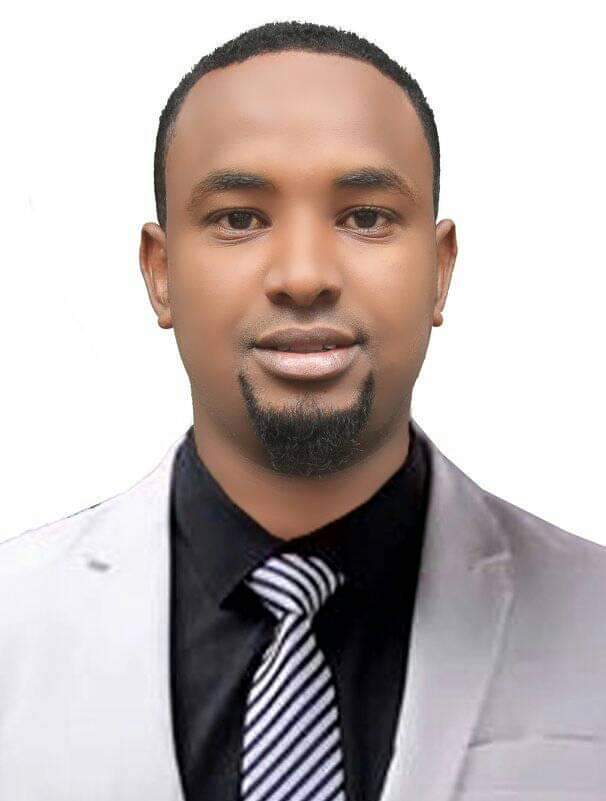
Objectives:
a. To be pioneer for up-grading of the medical education and allied health professionals education.
b. Provide training in Medical Education and health professionals educational programmes including curriculum designing, effective teaching methods, student assessment, programme evaluation, quality assessment and standards in health professions education.
c. Encourage cooperation between the medicals schools and allied training health sciences of the country.
d. Promote community-oriented medical education and community-based medical education as well as problem-based learning approaches and self-learning to develop in students the ability and willingness to pursue their own learning after graduation.
e. Train health personnel in the field of management and leadership through workshops.
f. Organize and implement continuing professional education activities.
ACHS has also reached its target of realizing the three stages of Medical Education and health professionals training but
is in great need to consolidate:
a. Basic medical education and health professionals training which we started on Academic year 2000-2001.
b. Postgraduate studies which started on Academic year 2012-2013 with public health, family medicine residence and nursing education
c. Continuing professional development which has been going on since the start of Amoud College of Health Sciences.
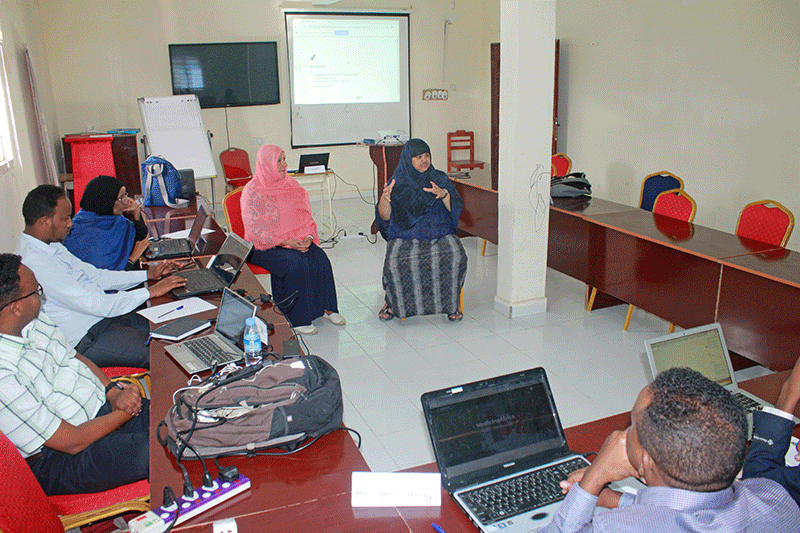
On Saturday, October 13th, 2018, Amoud College of Health Sciences – ACHS, Helds a Graduation Ceremony for Family Medicine Residency Programme, at Rays Hotel, The Ceremony was Attended by Somaliland Ministry of Health Vice Minister Mr. Nasir O. Jama, Saleban H. Hadi, Borama City Mayor, Ahmed A. Boqore, Amoud University, Vice President,AF, Dr.Sead A.Walhad, Principal of ACHS, Mr.Saed Habane, Dean of SPGSR,AU, other distinguished guests, family and friends.
At the beginning of the Ceremony Dr. Saed A. Walhad Principal of ACHS, expressed his great thanks for the graduated students and he wishes all the best for them in their journey to help the community, also he expressed his appreciation to Hope Organization on their remarkable Support for the Family Medicine Residency Programme Since it was Started in 2013.
Dr.Walhad Said" this programme helped ACHS to reach three Stages of health professionals training: Undergraduate training, postgraduate training, and Continuous professional development. and this Programme Will Allow Somaliland health provision to make a coverage of the needs of the regional and district Hospitals".
The ceremony was concluded by Awdaring Graduates their Certificates. Dr. Awale A. Ibrahim, Dr. Mohayadin H. Jama, Dr. Mubarak A. Magan, Dr. Hudayfa A. Ali, Dr. Yusuf A.Mohamed. and were also recognized for their outstanding overall academic performance.
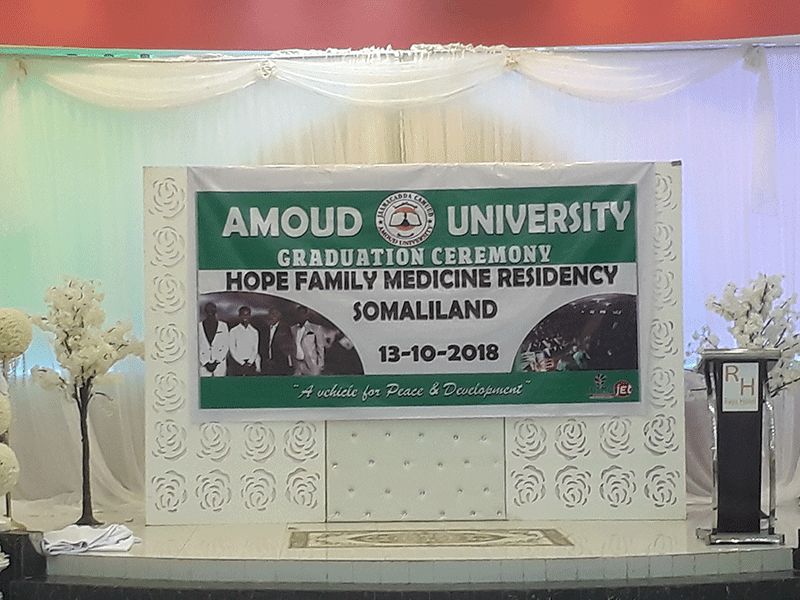
 English
English

